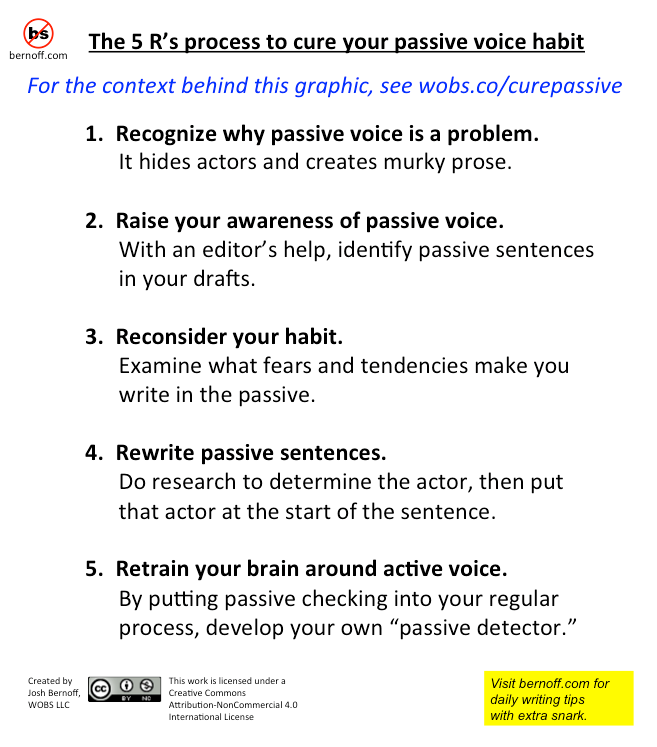A passel of pernicious passive voice (Master Post)
I take a lot of shit for telling people to avoid passive voice. But here’s the thing: passive voice hides things. It creates a distance between the writer and the reader. I actually considered writing a whole book on it called “Passive Evil.”
You think that’s too strong? Well, I’ve just reviewed all my posts on passive voice and the results show a passel of nasty motives. People use it for all sorts of lazy, sneaky, or weak-minded reasons. Maybe you don’t. But unless you want to sound like them, you ought to use less of it.
Laziness is not a good reason to write in passive voice
Here’s my point in a nutshell:
When you write in the passive, you make things harder for the reader. Rewriting sentences in the active voice makes you think — and that typically improves meaning. So make it a habit to identify and question every use of passive voice.
I am not an absolutist. Sometimes, when you rewrite a passive sentence, you end up putting the emphasis where it doesn’t belong (“More people have been robbed in our town this year” is superior to “Robbers have robbed more people in our town this year.”) What I am recommending is that each time you use or read the passive, that you think about why you’re doing it. If your reason is “I’m trying to hide something” or “I don’t want to look something up,” then you’re not serving the reader. Work harder.
If you still support passive voice, here are a list of shady things you can do with it, so long as you don’t care what people think of you.
Avoid responsibility
Looking back on my posts on passive voice, the most outrageous examples were people trying to evade responsibility.
Belgian Justice Minister Koen Geens after the bombings: “Mistakes were probably made by our agencies and in that case secretaries have to take their responsibilities.”
New York Times Public Editor on changes to a story about Hillary Clinton: “[T]he inaccuracies and changes in the story were handled as they came along . . . The first change I mentioned . . . was written into the story for hours without a correction or any notice of the change . . .”
Former Turing CEO Martin Shkreli on how the company raised drug prices: “[T]here were mistakes made with respect to helping people understand why we took this action.]
Imply stuff without saying it outright
Some people use passives is because their accusations would sound too nasty if they were written in active voice.
Antonin Scalia obliquely criticizing fellow justices: “The opinion is couched in a style that is as pretentious as its content is egotistic.”
Wells Report about Tom Brady’s responsibility for deflated footballs: “[T]he full extent of the decline in pressure cannot be explained by environmental, physical, or other natural factors.”
Hillary Clinton email article in the New York Times: “Two inspectors general have asked the Justice Department to open an investigation into whether sensitive government information was mishandled in connection with the personal email account Hillary Rodham Clinton used as secretary of state.”
Complain that somebody should fix things
If you don’t know who is supposed to fix a problem, you can just whine about it in the passive voice.
Boston 2024 Olympic Committee report: “[These] issues that will need to be closely monitored in order to ensure the public sector is protected from extensive financial commitments.”
Boston Globe writer Christopher Gasper on the Red Sox’ problems: “A move has to be made, a message has to be sent.”
Hide things that are scary or hideous
Some things don’t bear thinking about. Say them passively, and we don’t have to contemplate who’s doing these nasty things.
Tracking Point press release: “As a soldier pulls the trigger the enemy is automatically acquired and tracked. When trigger pull completes, the target is instantly eliminated.”
Fenway Park rules: “Any fan that directly or indirectly interferes with the enjoyment of the game will be promptly ejected from Fenway Park.”
Conceal your ignorance
If you don’t want to be specific about how things in government work, you can paper it over with passive voice, without mentioning specifically who needs to do it (or did it). Then you’ll sound like a political candidate.
Donald Trump interview on technology issues: “[T]he NSA has been given great latitude in how it conducts itself, especially after the events of 9/11. . . . [I]t should be given as much leeway as possible. However, American citizens are guaranteed certain protections.”
Bernie Sanders interview on how to break up big banks: “How you go about doing it is having legislation passed, or giving the authority to the secretary of treasury to determine, under Dodd-Frank, that these banks are a danger to the economy over the problem of too-big-to-fail.”
You can kick the passive addiction
You just need a plan. Read my 5-step program for getting rid of passives. The first step is to recognize them for the nasty habit they are. That way you won’t end up in my next post about pernicious passives.

Yes, yes, yes! Why is it so difficult to convince people to use active voice? As an editor I frequently face this problem and invariably some clients reject my active voice suggestions.